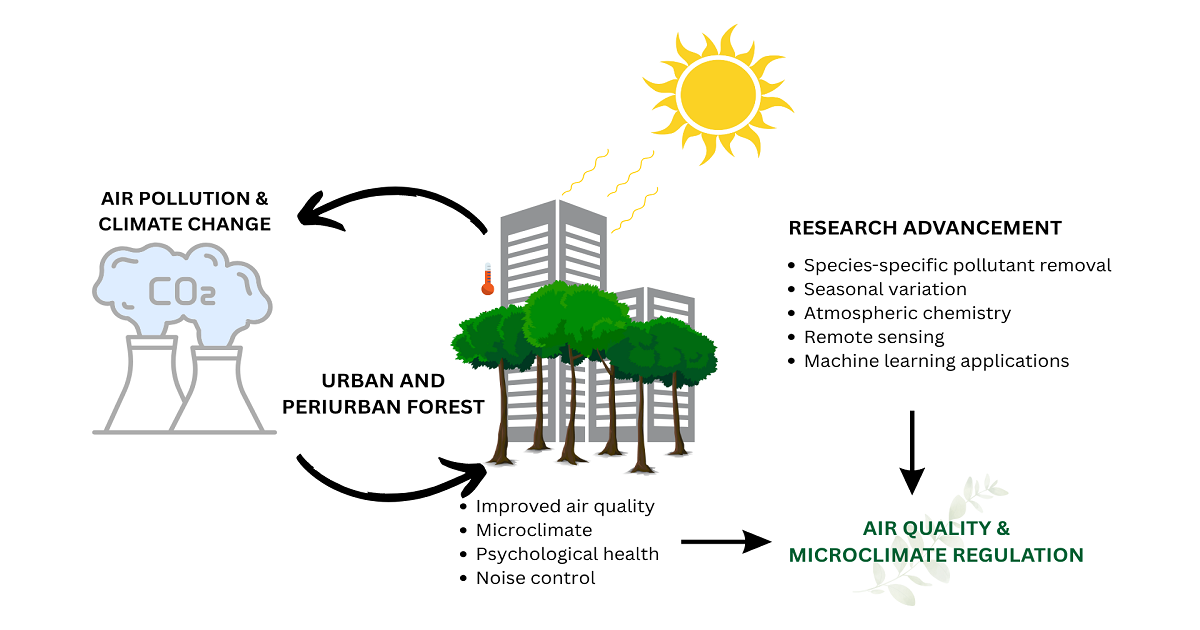Greening Our Cities: Urban Forests as a Nature-Based Solution for Air Pollution and Urban Heat Stress
A special issue of Forests (ISSN 1999-4907). This special issue belongs to the section "Urban Forestry".
Deadline for manuscript submissions: 31 March 2026 | Viewed by 4859

Special Issue Editors
Interests: ecosystem services and vegetation–air quality interactions; air quality monitoring and modeling; particulate matter (PM10, PM2.5) monitoring and analysis; pollen monitoring and health impacts; aerosol characterization and source apportionment
Interests: air pollution and forest ecosystems; climate change impacts on forest ecosystems monetary/non‐monetary valuation in forested areas
Interests: air pollution and climate change impacts; forest monitoring and ecosystem health; forest structure and biodiversity; advanced forest inventory techniques
Special Issue Information
Dear Colleagues,
The need to reduce air pollution and mitigate climate change has been recognized over recent decades through measures implemented at both the national and international levels; however, the serious consequences of increasing air pollution worldwide for ecosystems, human health, and climate remain persistent and are continually reported in highly recognized scientific research. Over the past decades, increased losses have been documented, especially in relation to hospitalization and mortality associated with elevated levels of air pollution and heat-related stress. It is well known that urban greenery improves human well-being by contributing to many factors, such as improved air quality, microclimate, psychological health, or noise control. This Special Issue aims to gather high-quality scientific contributions from leading experts in the field, with the aim of highlighting innovative advancements in the roles of urban and peri-urban forests in modulating air quality and regulating local microclimatic conditions. Studies focusing on species-specific pollutant removal capacities, underlying mechanisms, seasonal variations in the effectiveness of urban vegetation, and the interactions between urban greenery, atmospheric chemistry, and local climate are particularly encouraged. Additionally, we welcome innovative methodologies, including remote sensing, intensive ground-based measurements, and machine learning applications for predictive modeling, pattern recognition, and data integration across spatial and temporal scales.
Dr. Luminița Mărmureanu
Dr. Diana Pitar
Dr. Ștefan Leca
Guest Editors
Manuscript Submission Information
Manuscripts should be submitted online at www.mdpi.com by registering and logging in to this website. Once you are registered, click here to go to the submission form. Manuscripts can be submitted until the deadline. All submissions that pass pre-check are peer-reviewed. Accepted papers will be published continuously in the journal (as soon as accepted) and will be listed together on the special issue website. Research articles, review articles as well as short communications are invited. For planned papers, a title and short abstract (about 250 words) can be sent to the Editorial Office for assessment.
Submitted manuscripts should not have been published previously, nor be under consideration for publication elsewhere (except conference proceedings papers). All manuscripts are thoroughly refereed through a single-blind peer-review process. A guide for authors and other relevant information for submission of manuscripts is available on the Instructions for Authors page. Forests is an international peer-reviewed open access monthly journal published by MDPI.
Please visit the Instructions for Authors page before submitting a manuscript. The Article Processing Charge (APC) for publication in this open access journal is 2600 CHF (Swiss Francs). Submitted papers should be well formatted and use good English. Authors may use MDPI's English editing service prior to publication or during author revisions.
Keywords
- urban forests
- air quality
- particulate matter (PM₂.₅, PM₁₀)
- ozone
- urban heat islands (UHIs)
- heat-related stress
- ecosystem services
- green infrastructure
- vegetation–pollution interactions
- remote sensing
- urban resilience
Benefits of Publishing in a Special Issue
- Ease of navigation: Grouping papers by topic helps scholars navigate broad scope journals more efficiently.
- Greater discoverability: Special Issues support the reach and impact of scientific research. Articles in Special Issues are more discoverable and cited more frequently.
- Expansion of research network: Special Issues facilitate connections among authors, fostering scientific collaborations.
- External promotion: Articles in Special Issues are often promoted through the journal's social media, increasing their visibility.
- Reprint: MDPI Books provides the opportunity to republish successful Special Issues in book format, both online and in print.
Further information on MDPI's Special Issue policies can be found here.







